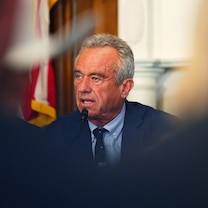What $9B spending cuts could mean for PBS, NPR stations, especially in rural areas
The House is set to approve an effort to claw back $9 billion from the budget.
Public broadcasting outlets that air programming from PBS and NPR could soon lose federal funding that they view as crucial to their operations -- a move that critics say will affect millions of Americans who turn to them for information and emergency alerts.
The House on Thursday is poised to approve an effort backed by President Donald Trump to claw back $9 billion from the federal budget -- which includes sweeping cuts to the Corporation for Public Broadcasting. The rescissions bill, which Senate Republicans passed early Tuesday morning, zeros out two years' worth of funding for the CBP: $1.1 billion.
CPB provides grants to local radio and television stations across the country, as well as the producers of well-known PBS and NPR programs. It's a roughly 75-25 split between public TV and radio, with most of the money going to TV.
NPR and PBS stations pay "dues" each year to their respective networks. As entities, NPR and PBS themselves receive relatively little of their annual revenues directly from CPB -- but they certainly do receive some. CPB's website shows some $13.5 million went to NPR in FY2024, while PBS headquarters received $77 million.
Local stations will take the brunt of the hits, particularly those that largely rely on CPB for their annual funding. Many stations, particularly in larger markets, have a variety of funding sources -- corporate underwriters/donors, state legislatures/agencies and "viewers like you."

Removing $1.1 billion out of public broadcasting is likely to have dramatic impacts across the system. Layoffs in newsrooms are widely feared. There could also be less new, original programming as a result.
Station and network managers -- who have yet to face a crisis of this magnitude in their sector of the media -- will be charged with deciding how to handle the cash crunch.
A number of Republicans that represent states with rural communities -- such as Sens. Lisa Murkowski of Alaska and Mike Rounds of South Dakota -- have expressed concerns about cuts to public broadcasting that could affect the ability of certain communities to access emergency alerts over radio and television.
"There is a lot of what the Corporation for Public Broadcasting does that I support, such as the 70 percent of the money that goes to the emergency fund to local stations. They maintain the emergency alert systems. They do public programming," Republican Sen. Susan Collins said earlier this week.
NPR's CEO Katherine Maher told CBS News that cuts to NPR would be a "real risk to the public safety of the country."

White House press secretary Karoline Leavitt responded to Maher's comments on Thursday, saying, "I am not sure how NPR, helps the public safety of our country, but I do know that NPR, unfortunately, has become really just a propaganda voice for the left."
"These are not honest news organizations. These are partisan, left-wing outlets that are funded by the taxpayers. And this administration does not believe it's a good use of the taxpayer's time and money," Leavitt said of both NPR and PBS.
Democrats have hit back, saying Republicans are trying to control media voices.
"This legislation is just the latest example of Republicans trying to jam their extreme right-wing ideology down the throat to the American people, which will hurt everyday Americans, and it's all ultimately in service of rewarding their billionaire donors," House Minority Leader Hakeem Jeffries said of the package.



